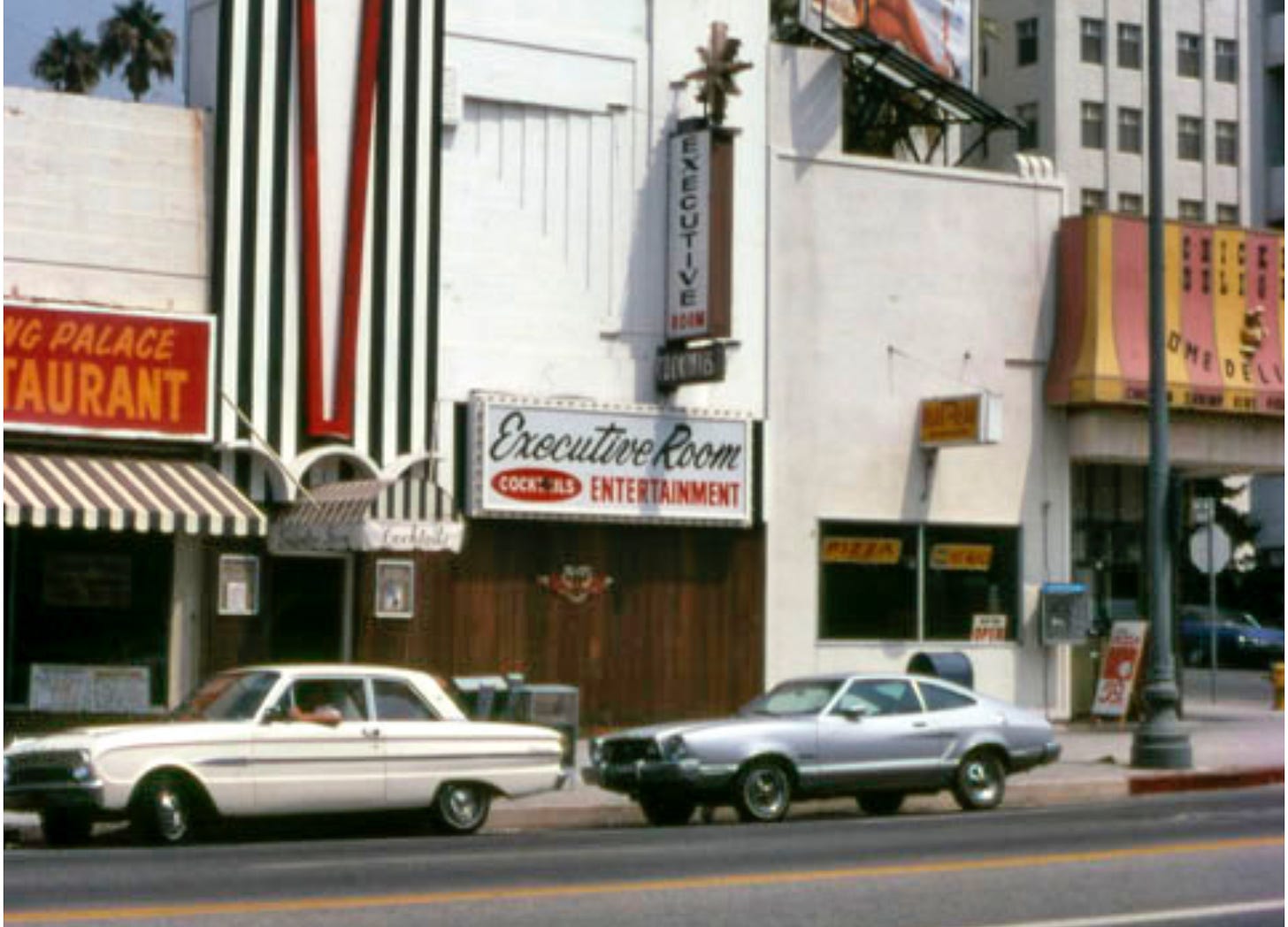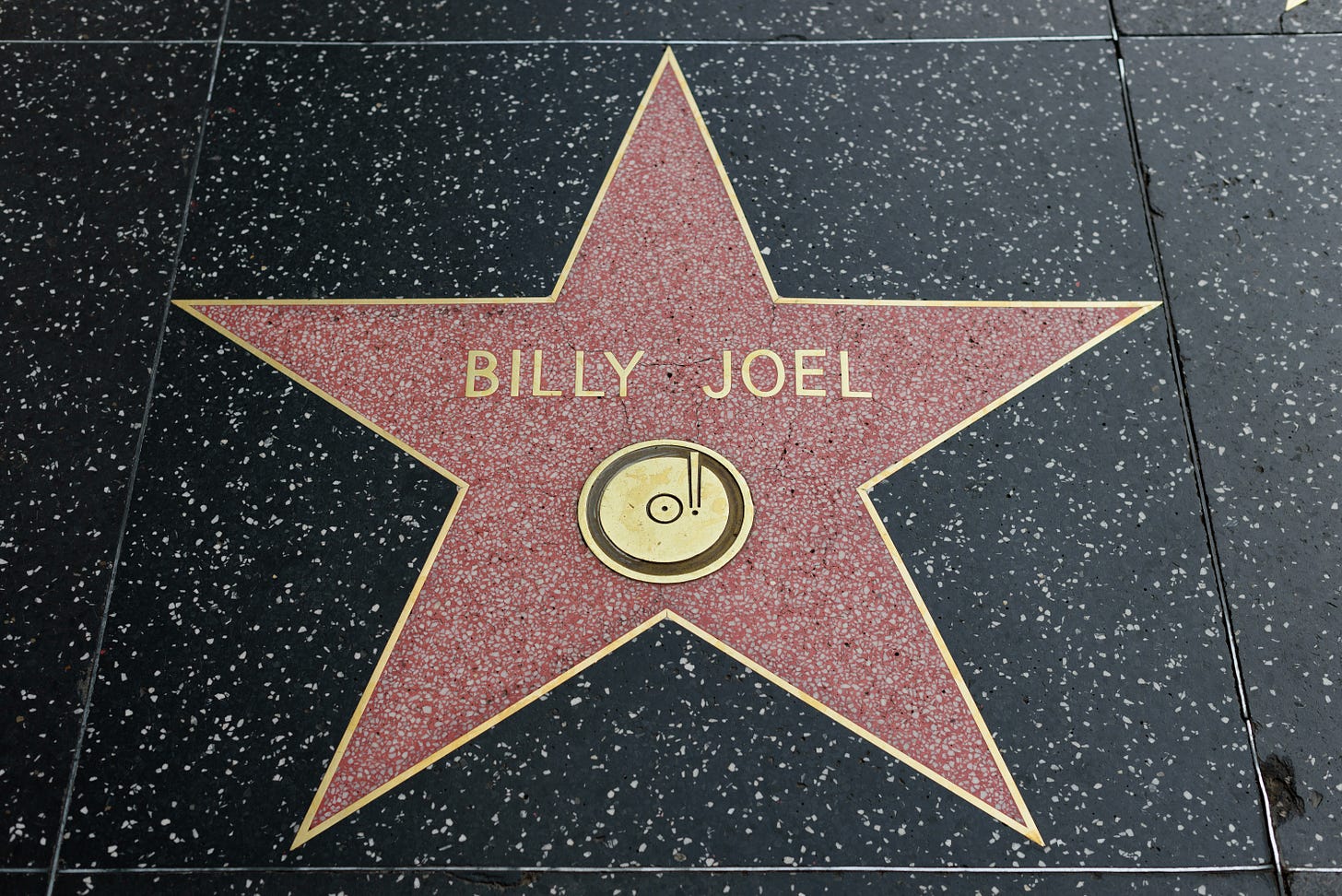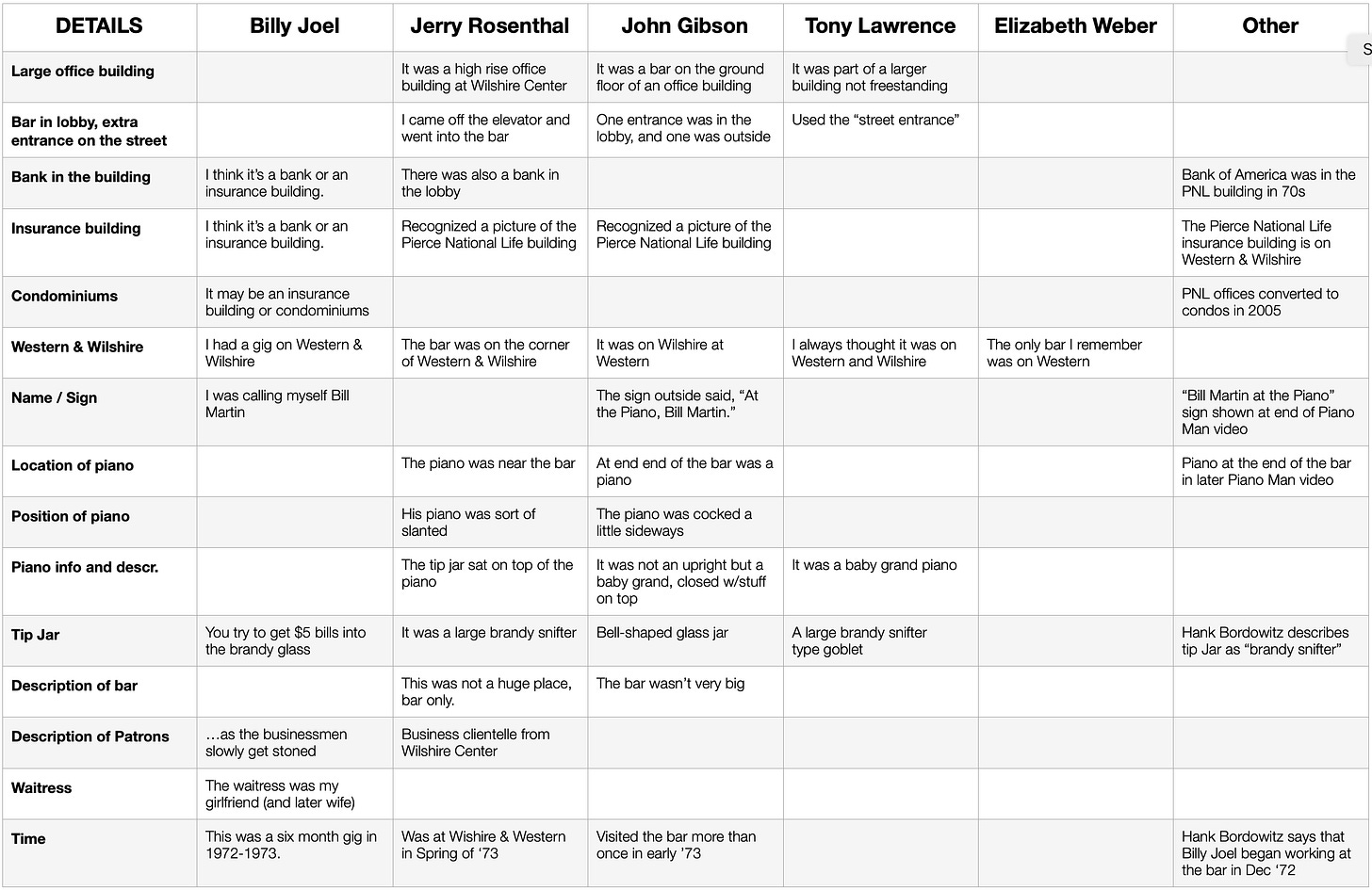Is My Dad One of the Characters in Billy Joel's "Piano Man"?
Who should I trust, my dad or the internet?
NOTE: I tell this story on my podcast. While this article provides more details (complete with images and supporting footnotes), in my “humble” opinion, the podcast version is the best place to start, since it features interviews with Billy Joel himself, along with many other fascinating characters. Click here to listen
A few years ago, my dad mentioned in passing that he happened to see Billy Joel perform at a cocktail lounge in Los Angeles before he became famous. At the time, I didn’t think much of his comment until later it dawned on me that Billy Joel wrote his song, “Piano Man,” about his experience at that piano bar, so I began to wonder whether my dad may have met some of the characters mentioned in the song. For example, had he met John the bartender, who was “quick with a joke or to light up your smoke,” “Davy, who was still in the Navy,” or “Paul the real estate novelist”? Then another question eventually occurred to me. What if my dad happened to be one of the characters described in this famous song? Could he be one of the businessmen who “slowly got stoned?” Is he the customer who “practiced politics” with the waitress? What if he’s the one who put “bread” in Billy Joel’s tip jar and said, “Man, what are you doin’ here?”1
Well, a few weeks went by, and I shared Dad’s remarks with my brother Daryl, who happened to be in town for a few days. Less than a minute went by before he whipped out his phone and began searching for information about the backstory to Piano Man. That’s when we first discovered that there were problems with Dad’s story.
According to Wikipedia, Piano Man was based on Billy Joel's real-life experience as a lounge musician in Los Angeles during a six-month period that spanned from 1972 to 1973.2 When my brother pointed this out to me, I immediately recognized the difficulty. You see, before I had done any fact-checking, I simply assumed that my dad visited this piano bar during his bachelor days when he lived in West Los Angeles in the late 60s. But if Billy Joel performed at this piano bar in late ’72 or early ’73, my dad couldn’t have been there, since by that time our family had moved to the other side of the country, to the small town of Bluefield, West Virginia.
As I began to look into this further, I discovered another problem. When I asked, my dad wasn’t able to recall the name of the bar he visited, but he was confident that it was on the corner of Western Avenue and Wilshire Boulevard. Yet, according to various online sources, Billy Joel used to perform at a place called “The Executive Room,” which was several blocks further west, near the corner of Wilshire and Gramercy.3 So in light of all these revelations, I began to have doubts that my dad had ever been to the piano bar that served as the inspiration for Piano Man.
Then something interesting happened. As I was discussing these things with my mom, she paused for a moment and recalled that there was a time while we lived in West Virginia when Dad went back to Los Angeles to look for work. She recalled that it was in the spring of ’73, since she had a specific memory of the daffodils blooming while he was away, and we ended up moving just a month or two later during the summer of that year.
With this new information, I decided to look a little more closely into the details of my dad’s story. Now that I could place him in Los Angeles in the spring of ’73, I wanted to find out precisely when it was that Billy Joel played piano at The Executive Room on Wilshire Boulevard. As I researched this question, I soon discovered that there’s a lot of conflicting information online. For example, though Wikipedia states that Billy Joel played at this piano bar sometime between 1972 and 1973, according to another site, this took place in 1971. This alternative date also appeared to be confirmed by a timeline of events that I discovered at billyjoel.com.4 Since this information came from the artist’s website, I assumed its timeline would be the most chronologically accurate. But if true, it would completely invalidate my dad’s story, since he was nowhere near Los Angeles from the late 60s until the spring of ’73.
Because of these conflicts, I decided to investigate things further by watching several Billy Joel interviews and skimming a few biographies. During one exchange with Charlie Rose, Joel said that he wrote Piano Man in 1973 while he was working “a six-month gig” at The Executive Room in Los Angeles. Additionally, in his book, Billy Joel: The Life of an Angry Young Man, Hank Bordowitz revealed that Joel made his debut at this cocktail lounge in December 1972, which would place him at this establishment until sometime around May of 1973.5 Now, since my mom had a specific memory of Dad being away while the daffodils bloomed in the spring of that year, it now appeared that my dad’s story was plausible after all. He had been in Los Angeles during the narrow window of time that Billy Joel performed at The Executive Room cocktail lounge.
But, of course, there was still the issue of the bar’s location to sort out. So I called my dad on the phone and began asking questions. “Dad, some of the descriptions and images of The Executive Room that I've been able to discover online end up placing this lounge closer to the corner of Wilshire and Gramercy. Does that location sound familiar to you at all?” “That’s not my recollection,” he replied. “My best recollection is that it was on Wilshire and Western. There was a bank in that building, and the lounge occupied the corner of the lobby.” “So you don’t remember it being closer to Gramercy?”, I inquired, hoping to jog his memory. “I remember the name Gramercy, but I’m pretty sure that the corner I’m talking about was Western.” My dad ended our conversation by saying, “I’m confident of that geography.”
The interesting thing about my dad’s story is that he kept insisting that the piano bar he visited was in the lobby of a large office building located at the intersection of Western and Wilshire. But all the pictures I found of The Executive Room on Wilshire Boulevard indicated that it was a freestanding building between a deli and a Chinese restaurant several blocks further west. In short, it wasn’t in an office building, it wasn’t on a corner, and it appeared to be at a completely different intersection. So even though my dad was in Los Angeles at precisely the right time, the more I listened carefully to the details of his story, the more it appeared that he had never actually been to the cocktail lounge that served as the inspiration for Piano Man.

Because my dad was so confident about the location of the bar he visited, at one point, I decided to look for references to Billy Joel’s piano bar experience using the specific coordinates he kept insisting upon. So when I included “Western and Wilshire” in my search terms, I discovered a 2014 Los Angeles Times article in which Billy Joel mentioned that specific intersection during a live performance at the Hollywood Bowl.6 So I spent some time searching YouTube for video clips related to that concert, and I eventually found the quote cited by the Times.7 In his introduction to the song, Piano Man, Joel says specifically, “This is a song about a gig I had on Western and Wilshire.” In this brief clip, Billy Joel confirmed what my dad had been saying all along. He wrote Piano Man while working at a bar that was located on Western and Wilshire, not Wilshire and Gramercy!
I also discovered something else. During a 2017 interview with the Library of Congress,8 Billy Joel was asked a few questions about the backstory to Piano Man, and at one point in the conversation, he stated that The Executive Room cocktail lounge no longer exists: “I think it’s a bank or an insurance building now.” This is a perfect match for the office building my dad kept describing, which for many years included a bank in its lobby, and to this day still features in bold letters the name of an insurance company at its top: “Pierce National Life.”9 On the other hand, Joel’s comments don’t fit at all with the other location near Gramercy, since that building ended up being demolished in the late 70’s as the property was converted into a parking lot for a strip mall.10

After looking closely into the details of my dad’s story, I was finally convinced that he had seen Billy Joel perform at The Executive Room, which served as the inspiration for Piano Man. When I shared the results of my investigation with my dad, he asked me how I was able to find all this information. I told him that most of it was available on the internet, but the difficult part was sorting through all the conflicting data. The most important puzzle pieces came from his memory of events that took place 50 years ago. This information, I told him, turned out to be more reliable than many of the supposed “facts” I was able to discover online. When I related this, he looked at me and said, “I’m stunned. Man, is the internet in trouble!”
Later, I decided to interview my dad about his experience for the pilot episode of The Humble Skeptic podcast, which I launched in the fall of 2022. After telling his story and making a case for the credibility of his claim, I spent some time picking his brain about everything he could potentially recall about the bar that was made famous in the song Piano Man. If you get a chance to listen to that episode, you’ll likely conclude as I did that my dad wasn’t there long enough to be mentioned in the song, but it’s fun to imagine him sitting there at the bar with all the other memorable characters. When I asked whether he recalled putting “bread” in Billy Joel’s tip jar11 as he got up to leave, he assured me he did, but that he failed to say anything remotely close to, “Man, what are you doin’ here?”
At the end of the day, I believe this story serves as a kind of cautionary tale. You see, initially, it was easy for me to believe my dad’s story because I trusted him. But sometimes the people we trust can be mistaken. When I discovered reliable sources of information that conflicted with my dad’s account, I began to have doubts. But sometimes “reliable sources of information” can also be mistaken. When I first began to read the Wikipedia story about Piano Man, I concluded that my dad was probably confused, and I would probably still be under that assumption today if it weren’t for a passing comment made by my mom. But when I discovered that my dad had been in the Wilshire district of Los Angeles in the Spring of ‘73, a new door of possibilities opened up.
I’m convinced that all of our beliefs and opinions are rooted in other pre-existing beliefs. If something is perceived to be implausible, it’s often dismissed as something unworthy of our consideration. In other words, it’s our present beliefs that end up determining what is or isn’t plausible. This is why we need to foster a healthy skepticism, not merely about the views of others, but of our own beliefs as well. As I started challenging every assumption related to my dad’s story and began to carefully investigate all the available facts and details, that’s when I ended up gaining confidence that I had eventually arrived at the truth!
UPDATE: Episode #55 features an interview with John Gibson, who worked for Atlantic Records and saw Billy Joel perform at the Executive Room on multiple occasions.
UPDATE: Episode #83 After watching And So It Goes, a recent HBO documentary series on the life of Billy Joel, Shane decided to reopen his investigation. This updated and expanded edition of the pilot episode also features a new segment that includes his conversations with people involved in the new documentary (including the co-director, Jessica Levin).
CHART: Below is a chart I put together featuring a handful of known visitors to the Executive Room. The fact that there are so many overlapping details about the piano bar indicates that the location of the bar on Western & Wilshire has now been thoroughly corroborated. Listen to episode #83 for most of the info cited in this chart.
Shane Rosenthal is the founder and host of The Humble Skeptic podcast. He was one of the creators of a national radio broadcast called the White Horse Inn, which he also hosted from 2019-2021. Shane received an M.A. in Historical Theology from Westminster Seminary California, and he lives with his family in the greater St. Louis area.
Related Episodes
The Bar That Inspired Piano Man, #83 (updated version of the pilot episode)
New Evidence for The Executive Room, #55 with John Gibson
Evidential Reasoning, #56 with Craig Parton
Dealing with Discrepancies, #57 with J. Warner Wallace
Year-End Special, #65 with Liam Cooper
The Pilot Episode, Humble Skeptic #01
Related Articles
The Executive Room According to Bob Egan, Pop Spots
How to Detect Deception, Shane Rosenthal
What is Faith? (PDF), Shane Rosenthal
The Virtue of Doubt, Shane Rosenthal
Humble Apologetics, Shane Rosenthal
Video
And So It Goes, HBO documentary series
And So It Goes (Trailer)
https://www.songfacts.com/lyrics/billy-joel/piano-man
https://en.wikipedia.org/wiki/Piano_Man_(song)
https://popspotsnyc.com/billy_joel_piano_man/. I don’t dispute that The Executive Room had a location on Wilshire near Gramercy, but I believe all the evidence taken together indicates that in early ‘73, Billy Joel performed at a location “on Western and Wilshire.” I used to theorize that The Executive Room later changed locations, but since phone book records indicate that it was located at the Gramercy in 1973, it is more likely that the bar Billy Joel performed at was a kind of satellite location.
https://www.billyjoel.com/timeline/
https://tinyurl.com/bjtimeline
https://www.latimes.com/entertainment/music/posts/la-et-ms-billy-joel-hollywood-bowl-20140518-story.html
https://tinyurl.com/bjoelhbowl2014
https://www.loc.gov/static/programs/national-recording-preservation-board/documents/BillyJoelInterview.pdf
https://www.loopnet.com/Listing/3807-Wilshire-Blvd-Los-Angeles-CA/4021455/
https://popspotsnyc.com/billy_joel_piano_man/. According to one biography I read, Billy Joel had a sign with his name placed in the window, which doesn’t fit with the Gramercy location, since no windows can be seen in the picture shown. But it does fit with my dad’s recollection of the bar he visited in the office building on Wilshire and Western. “The entire front wall of the bar,” he told me, “was made of glass.” Also, in the bonus segment added to the end of the Pilot Episode (jump to 40:07) I provide an additional audio clip in which Billy Joel once again places the location of the piano bar on “Western and Wilshire.” Though the bar is now “gone,” what is currently there is an “insurance building, or maybe condominiums.” This is a perfect fit for the Pierce National Life building since many of its floors were eventually converted into condos (https://la.urbanize.city/post/k-towns-pierce-national-life-building-going-residential).
When I asked for details, my dad told me that the tip jar was in the shape of “a large brandy snifter” that sat on the top of an “upright piano.” Both of these details were later confirmed.



